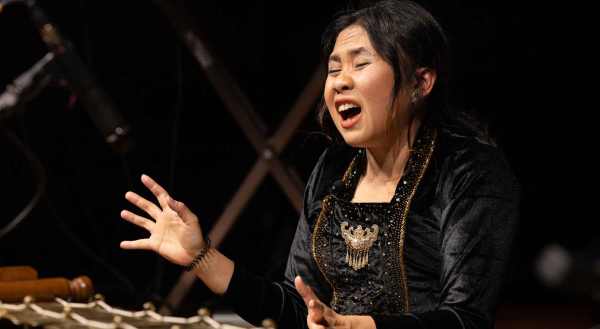

Peni Candra Rini
“Radeni Panji” begins and ends with what certainly passes as a free-form workout but we are in good hands and Rini and her musicians are always on the case: out of the apparent chaos unison melodic lines suddenly appear, shared in an unlikely coupling of rock guitar and suling (Javanese traditional wooden flute) and a degree of decorum returns, for a short while at least.
Peni Candra Rini has not only studied the traditional music of her culture but also teaches it at the Institute of the Arts in Surakarta in Central Java. The depth of her understanding of the music ensures that while the performances here might celebrate the wild side of life, this is conceptually in a different league from heavy rock music flirting with exoticism. Instead, Rini has taken modern, urban sounds and co-opted them into the traditional structures of Javanese music. Sometimes the traditional approach is allowed to speak for itself and we are reminded that the energy and dynamic changes which characterize much of the album were already there in the music that informed it, but in a more understated way. “Sok Ada Ada” recalls the traditional style more than some, being entirely percussive, combining Javanese metallophone with a kit drum and other percussion. While this thunders away at a pace Rini weaves her improvised vocal line above it in half-time.
These songs explore various themes from traditional Javanese art, scripture, culture, politics and shadow play and Rini's voice can move from a nuanced, tender delivery to a demonstrative scream in an instant. Her vocal style at times is taken from an ancient form of poetry known as macapat, while elsewhere it's inspired by daily street life. On “Tapal Kuda Liar” Rini imitates the sound of chicken satay sellers on the island of Madura, off the coast of the north coast of East Java, as they call out to their customers. According to Rini the lyrics “evoke the powerful and energetic speaking style of the Madurese, who are well known for their food, especially their sate... From the perspective of the 'refined' Central Javanese, the Madurese are wild and bombastic, free of the conservative social mores of Javanese court culture.” Wani is an eclectic and quite extraordinary album.
Further listening and reading:
Search RootsWorld
|